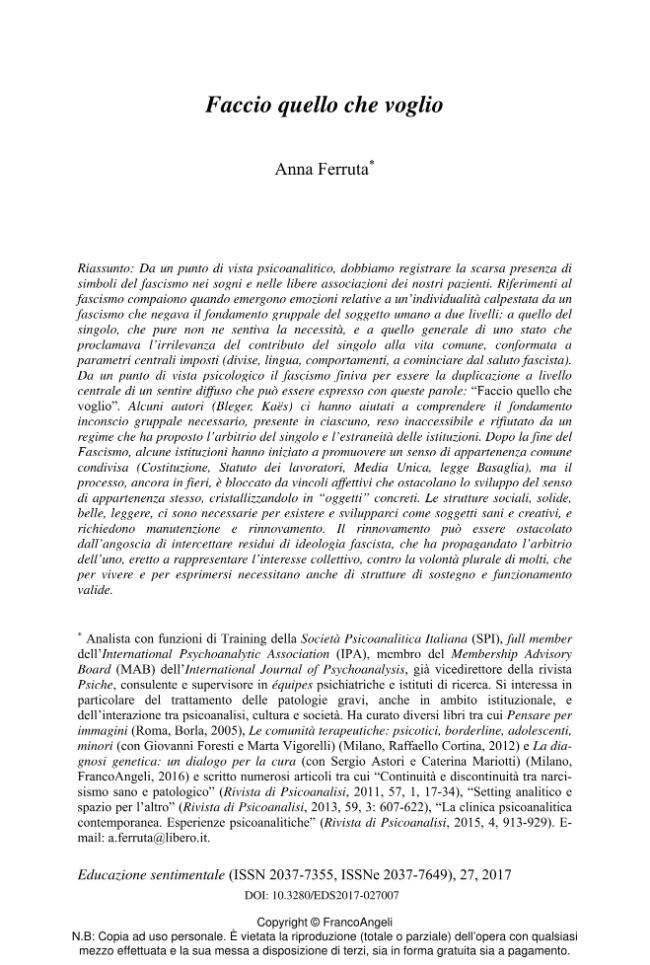Faccio quello che voglio
103-111 p.
Da un punto di vista psicoanalitico, dobbiamo registrare la scarsa presenza di simboli del fascismo nei sogni e nelle libere associazioni dei nostri pazienti. Riferimenti al fascismo compaiono quando emergono emozioni relative a un'individualità calpestata da un fascismo che negava il fondamento gruppale del soggetto umano a due livelli: a quello del singolo, che pure non ne sentiva la necessità, e a quello generale di uno stato che proclamava l'irrilevanza del contributo del singolo alla vita comune, conformata a parametri centrali imposti (divise, lingua, comportamenti, a cominciare dal saluto fascista). Da un punto di vista psicologico il fascismo finiva per essere la duplicazione a livello centrale di un sentire diffuso che può essere espresso con queste parole: "Faccio quello che voglio".
Alcuni autori (Bleger, Kaës) ci hanno aiutati a comprendere il fondamento inconscio gruppale necessario, presente in ciascuno, reso inaccessibile e rifiutato da un regime che ha proposto l'arbitrio del singolo e l'estraneità delle istituzioni. Dopo la fine del Fascismo, alcune istituzioni hanno iniziato a promuovere un senso di appartenenza comune condivisa (Costituzione, Statuto dei lavoratori, Media Unica, legge Basaglia), ma il processo, ancora in fieri, è bloccato da vincoli affettivi che ostacolano lo sviluppo del senso di appartenenza stesso, cristallizzandolo in "oggetti" concreti.
Le strutture sociali, solide, belle, leggere, ci sono necessarie per esistere e svilupparci come soggetti sani e creativi, e richiedono manutenzione e rinnovamento. Il rinnovamento può essere ostacolato dall'angoscia di intercettare residui di ideologia fascista, che ha propagandato l'arbitrio dell'uno, eretto a rappresentare l'interesse collettivo, contro la volontà plurale di molti, che per vivere e per esprimersi necessitano anche di strutture di sostegno e funzionamento valide. [Testo dell'editore].
I do what I want. From a psycho-analytical point of view, we must note the low proportion of fascist symbols in our patients' dreams and loose associations. References to Fascism appear associated to emotions dealing with an individuality trampled by a Fascism that denied the group basis of the human subject both at a individual level (not feeling the necessity of it), and at a general level (a government proclaiming the irrelevance of individuals' contribution to the common life, complied to imposed standards such as uniforms, language, behaviours, in particular the Fascist salute). From a psychological point of view, Fascism ended up being the central duplication of a common wisdom that could be expressed into these words: "I do what I want".
Some authors (Bleger, Kaës) helped us understand the unconscious group basis, embodied in every person, rendered inaccessible and denied by a system based on the individual's arbitrariness and strangeness of institutions. After the end of Fascism, some institutions began to encourage an agreed sense of belonging (Republican Constitution, Workers' Statute, Single High School, "Basaglia Act"), but the process, still in progress, is hampered by affective constraints limiting the development of the sense of belonging itself, crystallised in concrete "objects".
For being and developing ourselves as healthy and creative subjects, we need solid, nice, light social structures that ask maintenance and renewal. Renewal can be hindered by the anxiety of intercepting traces of fascist ideology, that propagated the individual's arbitrariness, set up as collective interest, against the plural will of the many who, for living and expressing themselves need effective and well-functioning support structures. [Publisher's Text].
Ist Teil von
Educazione sentimentale : 27, 1, 2017-
Artikel aus derselben Ausgabe (einzeln erhältlich)
-
Informationen
KEYWORDS
- Gruppalità inconscia, istituzioni, intersoggettività, identità singolare e plurale, fascismo
- Unconscious groupality, institutions, inter-subjectivity, singular and plural identity, Fascism



